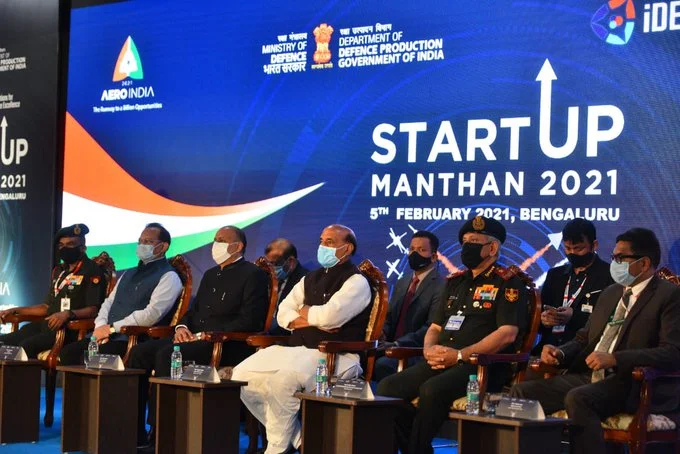The defence startup sector in India is going brisk with the developments. In the defence scenario of the country — young and promising minds are mingling together, building up the resources, bootstrapping on myriad finances and writing their success stories.
Scripting the success stories
Abhishek Jain, 24 from Pune set out on a journey as the Chief Business Officer of Zeus Numerix – which is a pioneering defense startup based in Pune. With an MTech in aerospace engineering from IIT Bombay degree in hand, Jain was wanted to take up something challenging.
Coming from a small town in Madhya Pradesh known as Mhow, he is the son of a government defense auditor.
In 2024, he propelled his journey along with two of his IIT Bombay lab mates—Basant Gupta, then 23, and Irshad Khan, 27. They established Zeus Numerix under the mentorship of Professor Gopal Shevare.
Pertinent to mention, Zeus Numerix was the first company to register with IIT Bombay’s Society for Innovation and Entrepreneurship.
In due course of time everyone was assigned a role; while Gupta became the CEO, Khan was appointed as the COO, and Shevare took the charge as Director.
Talking about the financial situation they faced initially, Jain says: “When we started in 2004, my monthly salary was Rs13, 500—quite low, even then, for an IIT graduate.”
However, expressing satisfaction, he maintains that it was just enough for dal-roti.
Doing well, except for 2009-10, we have been profitable,” he says while being reluctant to reveal his present earnings.
Initially the focus of Zeus Numerix was developing software for large-missile aerodynamics but has now expanded into structural design of missiles, guidance and control, electromagnetic, and stealth technology.
Not only that, but today the company manufactured smart drone-dropped bombs as well.
Jain, also being a Chairman of the StartUp Forum of the Society of Indian Defence Manufacturers (SIDM), the apex body of the Indian defense industry, Jain takes credit of playing a key role in integrating the BrahMos missile with the Sukhoi Su-30.
“The first water tunnel test of the indigenous LCA (Light Combat Aircraft) was conducted in our lab,” he adds.
There is a splurge in the defence startups ecosystem across India prompting about 400 startups that are active in about 350 projects under the Innovations for Defence Excellence (iDEX) and in about 100 under the Technology Development Fund (TDF). iDEX and TDF are defence ministry schemes to handhold startups.
According to Sameer Joshi, CEO and Director of Bengaluru-based NewSpace Research and Technologies, points out that the present government is blowing a new life into the private ecosystem which is acting as a catalysis for change –beyond the big players like Adani, Reliance, Kalyani, Mahindra, L&T, and Tata. These initiatives have jumpstarted and catalyzed the startup ecosystem.
NewSpace, founded in 2018, has come a long way. It has become a major player in the defence startup culture, specializing in long-endurance drones, robotic swarms, and combat intelligence suites. It also holds the credentials of being the world’s first high-density swarm drone system to the Indian Army and contributed to the design of HAL’s Warrior Loyal Wingman project.
There are diverse and unique stories of similar growth trajectory, in 2016, a Bengaluru-based Tardid Technologies, began their operation from a Café. Quite unusual, Aastha Verma, COO reminisces that they started working every day at CCD at 10 a.m. for next 16 months and later moved into a 12,000-square-foot space.
Aastha still finds it unbelievable to understand how it was all managed without any support of an external agency. Now a team of 60, grappled with challenges like conducting trials for an electric onboard motor with the Indian Navy while none of them knew how to swim. As they say hardwork never goes unpaid, today after braving the odds, Tardid’s AI-based products integrate physics and machine learning for autonomous ships and boats, is grabbing the attention of global clients.
“Our autonomous surveillance boat, Meglan, has keen interest from global customers like Egypt, Saudi Arabia, Kuwait and Bangladesh,” says Verma.
Supporting the Indian armed forces in operations like the Uri strike and post-Pathankot surveillance, Tonbo Imaging is just another leading startup, has set a high standard.
Holding equity investments from Artiman Ventures, Celesta Capital, Qualcomm, Edelweiss, and HBL Power Systems, Tonbo has raised over Rs300 crore for R&D. Its products include advanced imaging technologies are used by foreign governments, NATO, and even Mossad. Founder-CEO Arvind Lakshmikumar, 49 says: “It all began in 2009 and today more than 50 per cent of our revenue comes from international customers.”
The story doesn’t stop here, Agnit Semiconductors, is another progressive story from Bengaluru. Incubated at IISc Bengaluru and funded by the Ministry of Electronics and IT, Agnit is developing India’s first gallium nitride semiconductor products for defence applications. CEO Hareesh Chandrasekar expects production samples to be ready for system integration by December 2024.
ideaForge, another start up established in 2007, makes drones tailored for intelligence, surveillance and reconnaissance applications.
After an exponential growth, ideaForge has expanded from the innovation cell in IIT Bombay to establishing manufacturing facilities in Mumbai.
“We dedicate 22 percent of our annual revenue, amounting to over Rs47 crore last fiscal, to R&D,” says Mehta. “Our commitment to indigenous production ensures that imports constitute only 21 per cent of our costs, enhancing our financial sustainability.”
When we talk about the innovation in defence sector we must not forget to mention NimbusParc, another innovative startup, was founded in 2015 after director Srinivas Reddi was inspired to prove the capability of Indians. The company now develops cutting-edge technology for network-centric warfare.
Started in 2015, NimbusPar develops products in the real-time data transfer space―a key advantage in network-centric warfare. Its products are used by the DRDO.
Reddi notes that from past few years, there has been a spurt in ideas coming from a wide spectrum of individuals and start-ups.
“It is exciting that monopoly and exclusivity flavoured characteristics of defence technology has been altered to a more participatory and inclusive approach with the private sector, especially startups.”
With the support of government schemes like Innovations for Defence Excellence (iDEX) and the Technology Development Fund (TDF) there has been exponential growth in defence sector. The resultant of these schemes has led to stimulation of arounf 400 startups, working on projects ranging from miniaturized satellites to AI-enabled welding helmets.
In June, SpacePixxel Technologies signed the landmark 350th iDEX contract to make satellites for the Indian Air Force.
Braving the challenges and making strides
The startups like Big Bang Boom Solutions and Optimized Electrotech are carving out their niches. As the govt policies are undergoing a change, a positive change is being anticipated by the young companies that will shape the India’s defense sector.
As Ankit Mehta, CEO of ideaForge, a torcebeared in drone manufacturing, puts forth: “The private sector industry needs to ‘walk the talk’ and deliver what is most needed for the defense of our nation.”
In June, the landmark 350th iDEX contract was inked with SpacePixxel Technologies to make miniaturised satellites for the Indian Air Force. Under the TDF, 27 defence technologies have been successfully realised. S.A. Pasupathy, co-founder and director of Coimbatore-based Zeekers Technology, says the iDEX programme offers benefits to startups in terms of IP rights, co-funding and marketing opportunities in India and abroad. Zeekers developed an AI-enabled welder’s helmet (for real-time display of welding parameters that enables immediate corrective action).
ADITI (Acing Development of Innovative Technologies with iDEX) is held a hand to “support the development and acceleration of innovation in critical and strategic deep-tech technologies”. As it still lies in its infancy, ADITI will support start-ups with Rs25 crore for defence technology research, development and innovation.
An unprecedented Growth, Opening of New Avenues
Startups have organically developed into supply chain of defence production. If we talk of the year 2023-24, India’s defence production touched an unprecedented Rs1.27 lakh crore―a growth of 16.7 per cent from the previous year. Statistics also state the about 79.2 per cent was contributed by DPSUs and other state-owned public sector units, while the private sector (20.8 per cent) also recorded a steady growth.
The new gates of development and avenues are opening up from Indian startups.
Lately, an Israeli company has signed an MoU with a Surat-based Indian deep tech drone startup, InsideFPV, to buy 10,000 drones. Researches state that company source said they would be “kamikaze UAVs”.
Seven new projects were lately sanctioned to the MSMEs by the DRDO under the TDF scheme. Under this scheme an indigenous toolkit for simulator training of pilots would be developed. An underwater-launched UAV and a dual-use vehicle for detection, classification, localisation and neutralisation of underwater objects would also be made.
Sharing the Opinion
Chennai based Big Bang Boom Solution’s R. Shivaraman, chief technology officer is of the opinion that government initiatives are creating an ecosystem that fosters innovation and indigenous manufacturing. “Every week, we engage with the defence ministry and various stakeholders,” he says.
The company upgrades former combat vehicles, anti-drone systems and advanced AI-based solutions. Recently it has been successful to secure an order over Rs200 crore from the IAF and the Indian Army for its counter-unmanned aerial systems technology — the largest contracts the defence ministry has awarded under iDEX.
While sharing same opinion, Agnit Chandrasekar says that the defence ecosystem today is on the cusp of a change similar to that which the space sector underwent three-four years ago, in terms of policy reform and sustained governmental support.
Unpredictability and Challenges
The story isn’t as rosy nonetheless as it appears, everyone has to undergo a fair chance of struggle. The start-ups in the defence sector also have their due share of issues and challenges, the unpredictability of revenue from the defence and government clients being the biggest.
Reddi of NimbusParc says that procurement procedures and systems are not fully in place to welcome startups and MSMEs. “The procedures continue to favour DPSUs and large vendors who can survive the long procurement cycles,” he says.
Infrastructure also remains one big issue to fight. Joshi from NewSpace makes it clear that there is a need for the infrastructure needed to develop, test and certify products.”
Procurement is another challenge the start-ups are grappling with, Ahmedabad based Optimized Electrotech makes surveillance equipment for strategic and civilian applications and a series of weapon sights. Started in 2017, the company’s managing director Sandeep Shah says understanding how to navigate through procurement has been the biggest challenge. Besides that a longer revenue cycle is a major concern in defence manufacturing sales, although it has been addressed in its majority via the new defence acquisition procedure,” he says.
Besides that there are other unique set of challenges startups come face to face with. Tardid’s Verma says startups in the defence sector often challenges such as stringent regulatory requirements, long gestation periods, and the need for heavy investment in R&D. “However, these challenges present opportunities for startups to carve out niches and disrupt with innovation,” she says.
Lakshmikumar of Tonbo pin points another issue: “The government’s policy and intent is spot on, but there are companies that import knockdown Chinese systems, assemble them and call the product Indian-made.” He adds that a critical policy from the government should be to weed out these companies and separate the wheat from the chaff.
It’s a stark reality that over 60 per cent of these companies fail to make a mark in the first couple of years of their existence, however, there are some glad tiding coming up regarding the funding.
An official of the Chennai-based South Indian Defence Suppliers and Startups Association has urged the Defence Innovation Organisation to relax the funding part.
“The startup’s share may be 30 per cent, while 70 per cent comes from DIO (instead of 50-50),” the official says, requesting anonymity.
Encouraging startups has become more important than ever today as young minds are trying to make it big.
B. Krishnamoorthy, special secretary and project director, Tamil Nadu Industrial Development Corporation Limited (which looks after the defence industrial corridor), thinks startups drive the economic growth and technological innovation.
“Tamil Nadu is in the forefront,” he says. “In fact, Tamil Nadu has one of the largest numbers of iDEX winners. We have created centres of excellence in collaboration with major players like Dassault Systems, Siemens and GE Aviation which ensure that the tools and expertise from these majors are available to startups.”




